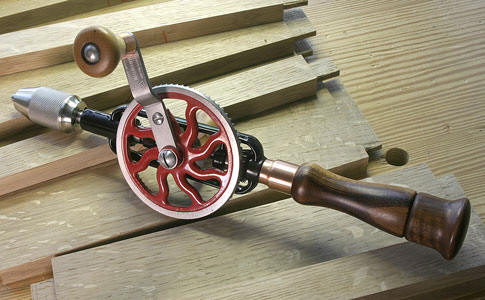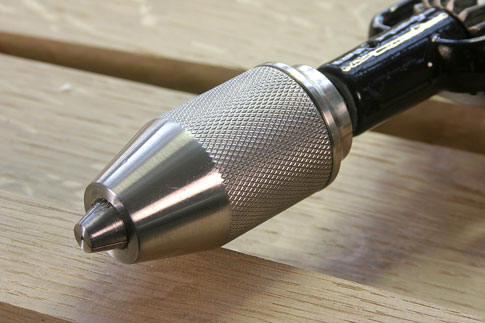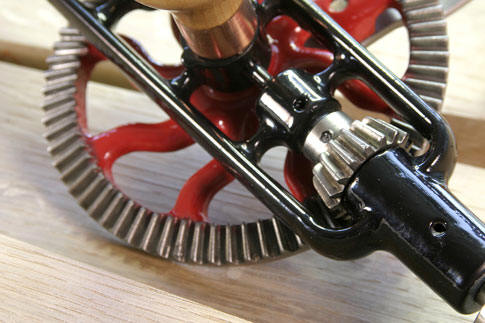|
For those of us who buy old tools, one of the fantasies
involves time travel. Wouldn’t it be cool to walk into a
hardware store in the late 19th century and buy a new
Stanley Bed Rock plane off the shelf? Or how about an
entire set of chisels from James Swan?

Until we build a time machine, we’re just going to have
to be satisfied with the work of Wiktor Kuc, who
rebuilds hand drills to better-than-new glory.
Back in April I wrote a blog entry about a Millers Falls
No. 5 that Kuc restored. Last week he loaned me a
Millers Falls 2A for evaluation. I was so blown away by
the tool, I had to show off some photos here on the
blog. And I also decided to break the color barrier to
do it.
And I wasn’t the only one who was impressed. This drill
was sitting on my desk a few days ago when Publisher
Steve Shanesy stopped by. He picked up the hand drill
and had a confused look on his face.
“Did Millers Falls start making these again?” he asked.
“This is incredible.”
Then Steve did what I did when I got the drill: He
looked at the knurling on the chuck. I have a beloved 2A
that I use all the time in my work and I thought my
drill was minty. Apparently I don’t know minty. The
chuck on Wiktor’s drill looks like it should still be
covered in lubricant from the factory floor. It’s just
that perfect.

The entire frame has been repainted and baked. Not a
flake or worn spot can be found. The wooden parts have
been replaced with new turned parts , plus new ferrules.
The only evidence I can find on this drill that it is
not 5 minutes old (instead of 40+ years old) is that the
drive gear has the slightest evidence that it was once
pockmarked by rust. The rust is gone, but the tiny pits
remain, if you look close enough.
In use, the thing is as good as it looks. All the gears
mesh tightly and the crank handle spins with very little
effort thanks to the thorough de-gunking from Kuc.
Of course, there is an ethical issue here to be debated.
When I posted my last blog entry I received a fair
number of private e-mails from people who were worried
that restoration work like this could easily get out of
hand. That anything other than a gentle cleaning ruins a
tool’s status with collectors. And even if it were a
user tool in question, one should only do what it takes
to get the tool running again. Removing the patina of
use erases the tool’s beauty and the evidence of the
craftsmen who used it before.
These are good points that should be debated. Here’s my
take: I see these drills at every tools sale and flea
market I haunt. They show up on eBay like clockwork. As
far as I know there are enough of these drills for 100
museums dedicated to the great hand drills of Millers
Falls.
Even someone with Kuc’s work ethic shouldn’t be able to
deplete our supply of Millers Falls drills.
And Kuc is providing a service that might not be
obvious. I love old tools and their patina, but there
are lots of customers who will buy only new tools. I
once spent a half hour begging a guy to buy an old brace
instead of a new one. No matter how excellent (and
inexpensive) the old ones were, he had to buy new. And
this guy isn’t alone.
So if you like old tools and want a vintage hand drill,
here’s what you should do: Visit OldToolHeaven.com , the
best site for researching Millers Falls products. Pick
out a few of the drills you like and start haunting the
flea markets and online auction sites. I guarantee
you’ll find a decent drill for about $25 that will work
with little or no restoration work on your part.
Or, if you like new and shiny, then visit WKTools.com
and browse through his selection. Kuc has excellent
taste in drills; I didn’t see any of the low-rent hand
drills that were intended for light-duty on his site.
Just the premium iron.

Christopher Schwarz
August 4, 2008
Chris is a contributing editor to Popular Woodworking
Magazine and the publisher at
Lost
Art Press. He's a hand-tool enthusiast (though he
uses power tools, too).
[This article is republished from Popular Woodworking
website. WK] |